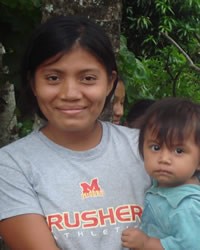Pech in Honduras

Photo Source:
Anonymous
|
Send Joshua Project a map of this people group.
|
| People Name: | Pech |
| Country: | Honduras |
| 10/40 Window: | No |
| Population: | 7,200 |
| World Population: | 7,200 |
| Primary Language: | Pech |
| Primary Religion: | Christianity |
| Christian Adherents: | 70.00 % |
| Evangelicals: | 6.00 % |
| Scripture: | Unspecified |
| Ministry Resources: | No |
| Jesus Film: | No |
| Audio Recordings: | Yes |
| People Cluster: | Central American Indigenous, other |
| Affinity Bloc: | Latin-Caribbean Americans |
| Progress Level: |
|
Introduction / History
The Pech (also called pejoratively Payas or Payitas by the Latinos) called themselves "Pech" which means "People" but only refers to their own race. They call other people "Pech-Hakua" which means "Other People."
Originally, they lived on the Honduran coast of La Moskitia from where the Spanish conquistadors and Miskitos chased them. Thousands died, and the others fled to the heart of the rainforest. 90% of them live farther inland in the district of Olancho, principally in the municipality of Dulce Numbre de Culmi and San Esteban. The remaining live in the districts of Colon and Gracias a Dios. The rivers marking the natural borders of the Pech territory are the Platano, Wampu, Grande, Tinto, Cuyamel, and Patuca. These rivers constitute an essential foundation for their agriculture, transportation, and commerce.
What Are Their Lives Like?
Traditionally, the villages were organized and led by a tribal council from which the Casique (village chief) was the head. Today, however, in the face of the political challenges facing the Pech, the communities have reorganized themselves with a political core more apt to be recognized by the Honduran Government. Each Tribal Council is now composed of a President, Vice President, Secretary, Treasurer, and other officers. These bodies have more power than the traditional Casique.
Today, with increasing assimilation into Latino society and more intermarriage, the number of pure Pech people is decreasing rapidly. Of the remaining population, less than half speak their ethnic tongue fluently. With the loss of language, culture disappears rapidly. Unless steps are taken to support local efforts, the current generation might be the last of the Pech people.
What Are Their Beliefs?
The Pechs are primarily Roman Catholic with an Evangelical minority.
What Are Their Needs?
The Pechs need their identity to be centered in Christ.
Prayer Points
Pray for the Pechs to understand that God blesses them beyond measure, and they should give him their all.
Pray for revival to hit Pech families and churches, leading hundreds to take Christ to other parts of Latin America and Africa.
Pray for Pech disciples to disciple others.